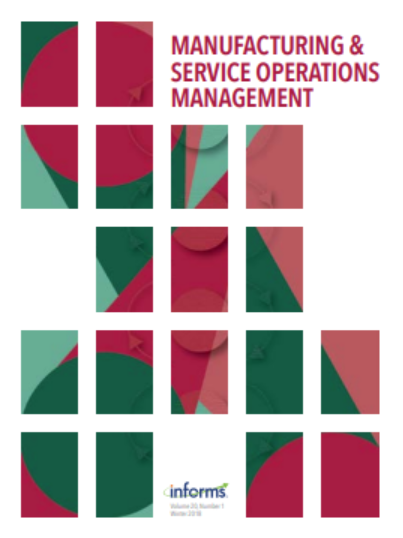医疗保健业务:医师在捆绑支付中的角色整合
IF 4.8
3区 管理学
Q1 MANAGEMENT
M&som-Manufacturing & Service Operations Management
Pub Date : 2023-05-01
DOI:10.1287/msom.2023.1187
引用次数: 1
摘要
问题定义:根据现行的按服务收费(FFS)付款方式,医院获得固定付款,而医生则根据特定诊断进行的每次治疗或程序收取单独费用。在FFS下,医院和医生的激励措施不一致,导致效率低下。捆绑付款(BP)是FFS的另一种选择,将向医院和医生统一付款,预计将鼓励护理协调并降低不断增加的医疗保健费用。然而,由于医院在影响护理(医生整合水平)方面与医生的关系不同,因此在不同医生整合水平的医院系统中,捆绑销售的预期效果仍不清楚。学术/实践相关性:缺乏对医院和医生捆绑激励的学术和实践理解。我们的研究建立并扩展了最近关于替代支付模式的运营管理文献。方法:我们制定了博弈论模型来研究(1)医院和医生之间的整合水平对采用BP的影响;(2)在整合水平的范围内,捆绑对整体护理质量和成本/节省的影响。结果:我们发现(1)医师整合程度中低的医院比医师整合程度高的医院有更多的捆绑动机;(2)为了吸引医生,医院需要在经济上激励他们,这是传统的基于ffs的支付模式所不具备的机制;(3)在可行的情况下,BP有望降低护理强度,而这种护理强度的降低有望在低至中等医生整合水平的医院系统中带来质量改善和成本节约;(4)然而,当捆绑发生在医师整合水平相对较高的医院系统中时,BP可能导致护理供应不足,最终导致质量下降;(5)在医院也对质量负责的环境下,捆绑销售对相关方的激励将更高,但由于捆绑销售而导致的质量脆弱性可能会加剧。管理意义:我们的研究结果对政策制定者、医疗保险和医疗补助服务中心等支付方和医院具有重要的管理意义:(1)政策制定者和支付方应该意识到并解释当前BP设计对医院系统子集的潜在负面影响,包括可能的质量降低;(2)在决定是否加入BP时,医院应考虑其医师整合水平及其可能对质量的影响。根据我们的研究结果,我们预计BP的广泛使用可能会通过医院合并或服务线关闭引发进一步的市场集中。补充材料:在线附录可在https://doi.org/10.1287/msom.2023.1187上获得。本文章由计算机程序翻译,如有差异,请以英文原文为准。
The Business of Healthcare: The Role of Physician Integration in Bundled Payments
Problem definition: Under the prevailing fee-for-service (FFS) payments, hospitals receive a fixed payment, whereas physicians receive separate fees for each treatment or procedure performed for a given diagnosis. Under FFS, incentives of hospitals and physicians are misaligned, leading to large inefficiencies. Bundled payments (BP), an alternative to FFS unifying payments to the hospital and physicians, are expected to encourage care coordination and reduce ever increasing healthcare costs. However, as hospitals differ in their relationships with physicians in influencing care (level of physician integration), the expected effects of bundling in hospital systems with a varying level of physician integration remains unclear. Academic/practical relevance: There is a lack of both academic and practical understanding of hospitals’ and physicians’ bundling incentives. Our study builds on and expands the recent operations management literature on alternative payment models. Methodology: We formulate game-theoretic models to study (1) the impact of the level of integration between the hospital and physicians in the uptake of BP and (2) the consequences of bundling with respect to overall care quality and costs/savings across the spectrum of integration levels. Results: We find that (1) hospitals with low to moderate levels of physician integration have more incentives to bundle as compared with hospitals with high physician integration; (2) to engage physicians, hospitals need to financially incentivize them, a mechanism that was not available in traditional FFS-based payment models; (3) when feasible, BP is expected to reduce care intensity, and this reduction in care intensity is expected to result in quality improvement and cost savings in hospital systems with low to moderate level of physician integration; (4) however, when bundling happens in hospital systems with a relatively higher level of physician integration, BP may lead to underprovisioning of care and ultimately quality reduction; (5) in an environment where hospitals are also held accountable for quality, the incentives for bundling will be higher for involved parties, yet quality vulnerabilities due to bundling can be exacerbated. Managerial implications: Our findings have important managerial implications for policy makers, payers such as the Center for Medicare and Medicaid Services, and hospitals: (1) policy makers and payers should be aware of and account for potential negative effects of current BP design on a subset of hospital systems, including a possible quality reduction; (2) in deciding whether to enroll in BP, hospitals should consider their level of physician integration and possible implications for quality. Based on our findings, we expect that a widespread use of BP may trigger further market concentration via hospital mergers or service-line closures. Supplemental Material: The online appendices are available at https://doi.org/10.1287/msom.2023.1187 .
求助全文
通过发布文献求助,成功后即可免费获取论文全文。
去求助
来源期刊

M&som-Manufacturing & Service Operations Management
管理科学-运筹学与管理科学
CiteScore
9.30
自引率
12.70%
发文量
184
审稿时长
12 months
期刊介绍:
M&SOM is the INFORMS journal for operations management. The purpose of the journal is to publish high-impact manuscripts that report relevant research on important problems in operations management (OM). The field of OM is the study of the innovative or traditional processes for the design, procurement, production, delivery, and recovery of goods and services. OM research entails the control, planning, design, and improvement of these processes. This research can be prescriptive, descriptive, or predictive; however, the intent of the research is ultimately to develop some form of enduring knowledge that can lead to more efficient or effective processes for the creation and delivery of goods and services.
M&SOM encourages a variety of methodological approaches to OM research; papers may be theoretical or empirical, analytical or computational, and may be based on a range of established research disciplines. M&SOM encourages contributions in OM across the full spectrum of decision making: strategic, tactical, and operational. Furthermore, the journal supports research that examines pertinent issues at the interfaces between OM and other functional areas.
 求助内容:
求助内容: 应助结果提醒方式:
应助结果提醒方式:


